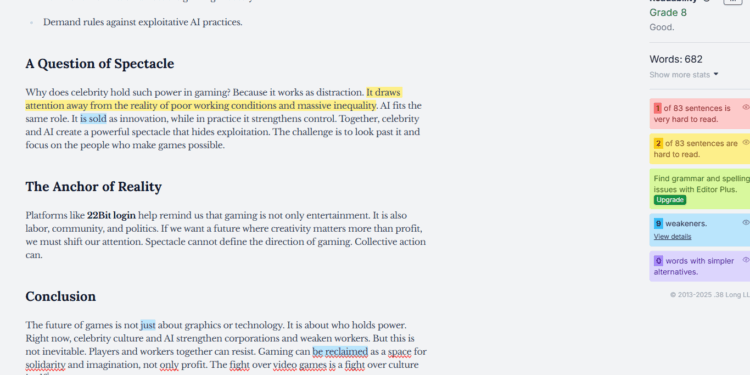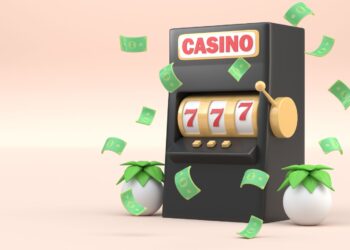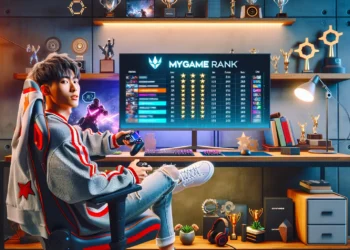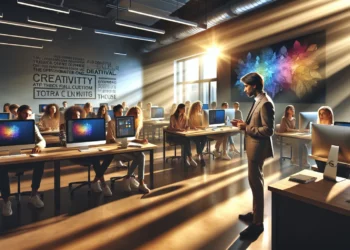Gaming and Celebrity Culture
Video games were once about players and communities. Over time, they have changed. Today, celebrities step into gaming with endorsements, branded deals, and even esports teams. The focus shifts away from community voices. Instead of players building culture together, the spotlight lands on famous names. For companies, this is convenient. Selling a game is easier with a star’s face attached. For workers and fans, it means less space to shape the culture themselves.
The Role of AI in Gaming
Artificial intelligence is now central to the future of games. Companies use it for design, dialogue, and even game balance. On the surface, this sounds like progress. But the impact is more complicated. AI risks taking away jobs from developers, artists, and writers. It also concentrates power in the hands of major studios. These same studios already underpay staff and resist unions. With AI, they can justify cutting costs even more. Celebrities help soften the image, turning exploitation into spectacle.
Market Power and Control
Celebrity involvement makes the industry more predictable. A famous figure streaming a new game draws massive attention. Independent studios, without money for stars, struggle to be seen. AI adds another layer of control. It tracks consumer behavior, predicts trends, and shapes advertising. This creates a cycle where creativity is reduced to formulas. Games become less about new ideas and more about what sells. Power shifts further away from workers and toward big corporations.
Accessibility or Illusion?
Supporters often claim celebrity influence makes gaming “accessible.” But who is it really for? When a celebrity launches a game or streams one, the event highlights them, not the players. The culture becomes centered around profit, not participation. AI tools add to this illusion. They promise personalized experiences while locking content behind paywalls and microtransactions. Accessibility becomes a marketing slogan rather than a real change for working-class players.
What Needs to Change
From a radical left view, the problem is structural. Celebrity culture and AI are not neutral. They reflect capitalism’s drive to turn every aspect of play into profit. Gaming used to thrive on experimentation and community. Now it risks becoming a controlled marketplace. If nothing changes, creativity and solidarity will be replaced by endless branding. The solution lies in resistance, not acceptance.
Problems With Celebrity-Driven Gaming
- Workers lose control over creative processes.
- Independent projects are sidelined.
- AI accelerates job cuts and profit-making.
- Accessibility is used as a marketing trick.
Alternative Paths
The future is not fixed. Communities can still shape gaming culture. Open-source projects, cooperative studios, and worker-led initiatives show a different path. These spaces are often small, but they prove games do not need stars or corporate monopolies to thrive. Supporting them means putting money and energy into projects that value solidarity over spectacle.
Radical Alternatives
- Fund worker-owned studios.
- Support open-source and community-led servers.
- Push for unionization across the gaming industry.
- Demand rules against exploitative AI practices.
A Question of Spectacle
Why does celebrity hold such power in gaming? Because it works as a distraction. It draws attention away from the reality of poor working conditions and massive inequality. AI fits the same role. It is sold as innovation, while in practice it strengthens control. Together, celebrity and AI create a powerful spectacle that hides exploitation. The challenge is to look past it and focus on the people who make games possible.
The Anchor of Reality
Platforms like 22Bit help remind us that gaming is not only entertainment. It is also labor, community, and politics. If we want a future where creativity matters more than profit, we must shift our attention. Spectacle cannot define the direction of gaming. Collective action can.
Conclusion
The future of games is not just about graphics or technology. It is about who holds power. Right now, celebrity culture and AI strengthen corporations and weaken workers. But this is not inevitable. Players and workers together can resist. Gaming can be reclaimed as a space for solidarity and imagination, not only profit. The fight over video games is a fight over culture itself.















